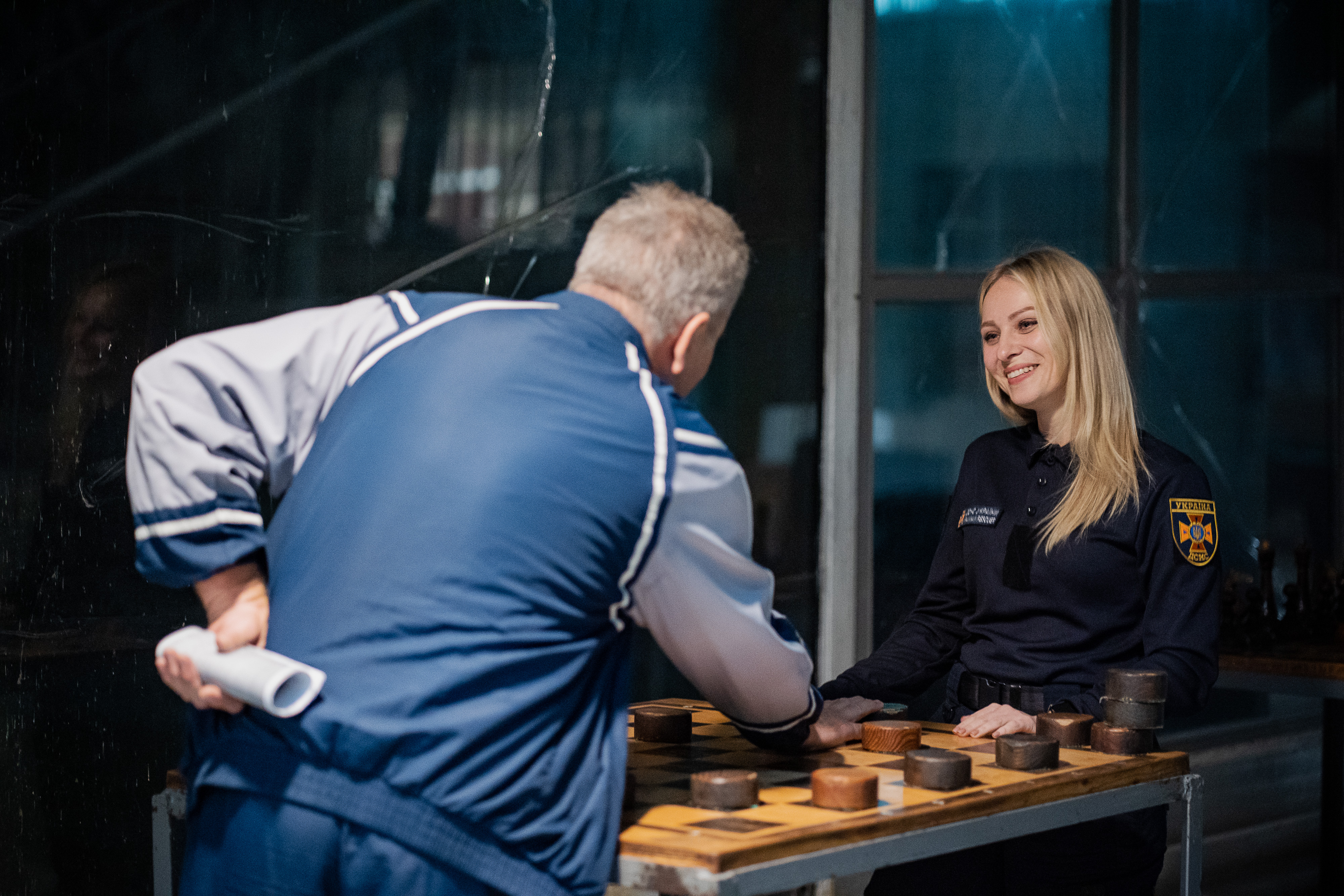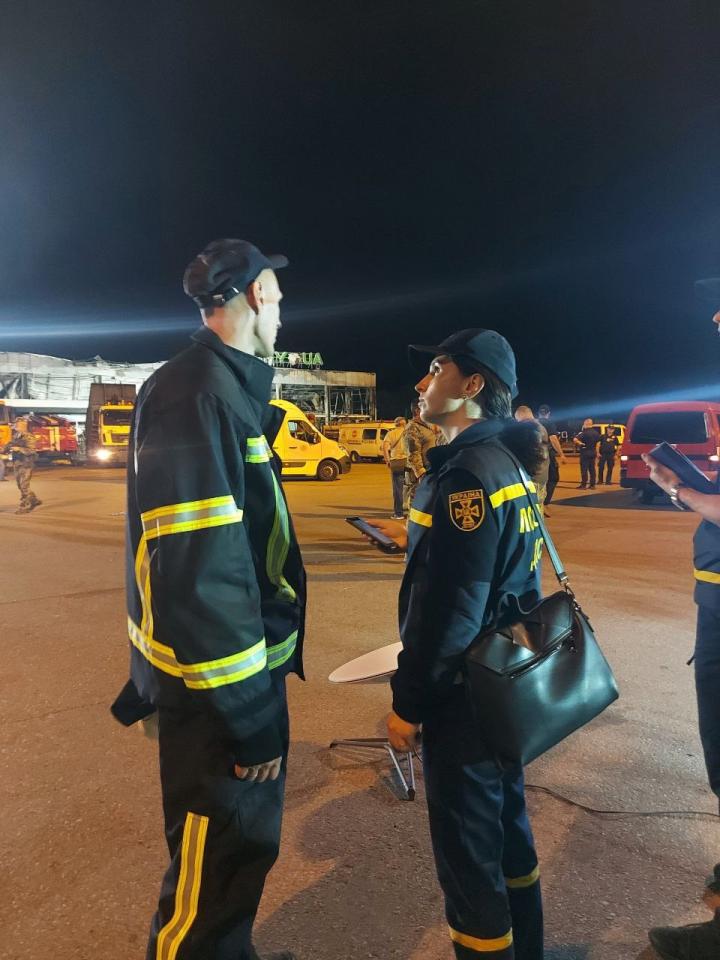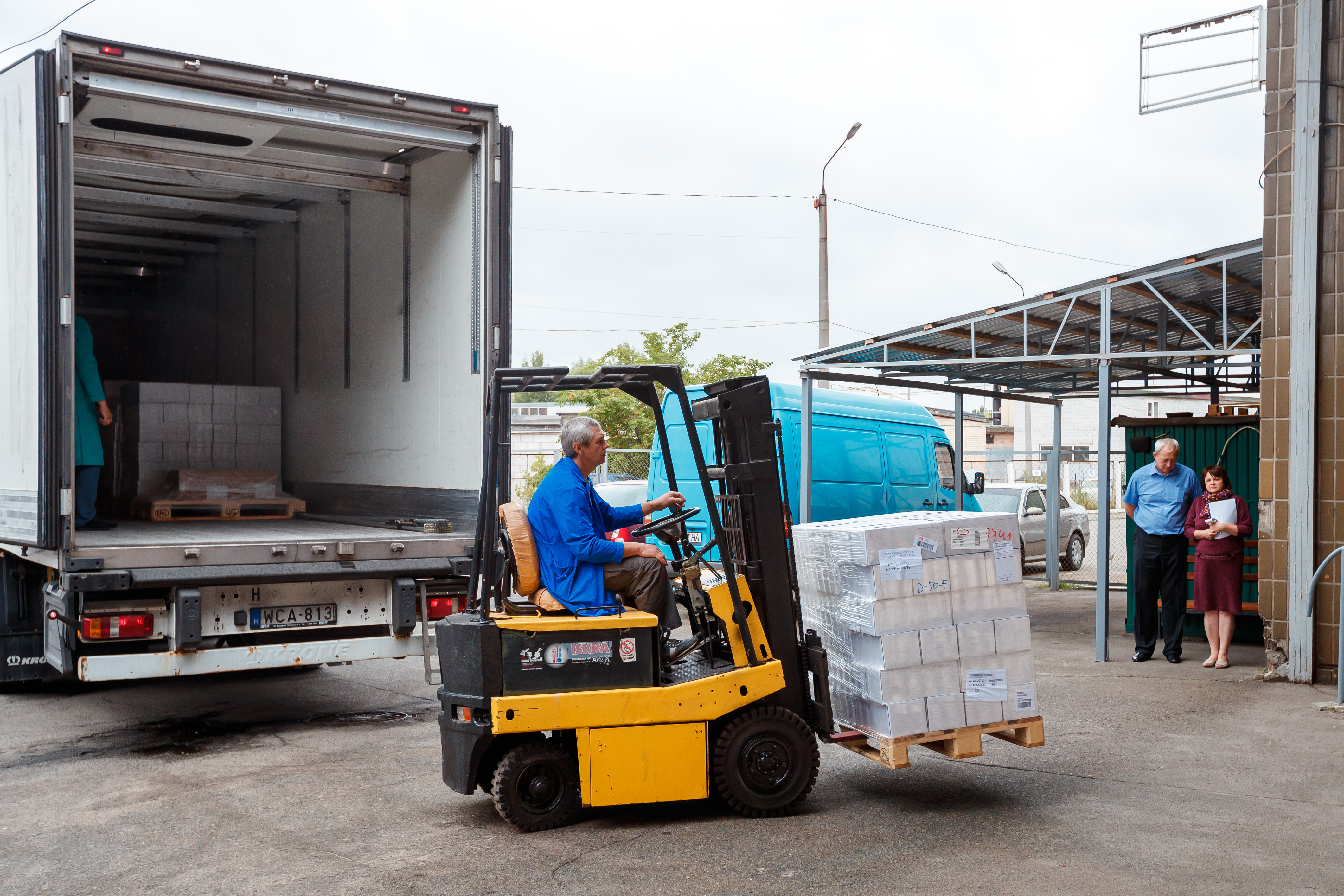When support becomes a mission for psychologists with the State Emergency Service of Ukraine
November 30, 2023

SESU psychologist plays checkers with a patient at 'Forest Grade' Centre for Mental Health and Rehabilitation during a visit.
A group of twenty individuals is visiting the ‘Forest Glade’ Centre for Mental Health and Rehabilitation. As they move through various rooms, they pause in the psychologist's office to observe. This center holds the distinction of being Ukraine's pioneering institution in providing aid for people suffering from psychotrauma, especially for those who have endured captivity and torture.
The tour of ‘Forest Glade’ forms a component of a specialized training program for psychologists from the State Emergency Service of Ukraine (SESU). This initiative, organized by the United Nations Development Programme (UNDP) and funded by the Japanese Government, aims to elevate the proficiency of psychologists in assisting individuals affected by war-related trauma. Participants, including SESU personnel from Mykolaiv, Nikopol, and Zaporizhzhia, have come from various regions across Ukraine to engage in this three-day training event.
Among the attendees is Tetiana Vatuliova, a seasoned psychologist with over two decades of experience at SESU. She is deeply engrossed in the training, attentively listening and diligently taking notes. Her extensive experience could easily qualify her to conduct these lectures herself.

Tetiana Vatuliova, psychologist at the SESU in Poltava Oblast.
Since February 2022, Tetiana has been providing psychological support in areas impacted by rocket attacks, aiding employees of affected enterprises, and offering solace during funerals. However, one of her most challenging experiences occurred on June 27, 2022, when a missile hit a mall in Kremenchuk, Ukraine, her hometown.
"Following the explosion, the initial reports were deeply distressing. We heard that thousands might be inside," Vatuliova recalls. She reflects on 'Amstor', the targeted mall, known for its usual hustle and frequented particularly by young people. Local authorities reported 22 fatalities in the tragic incident.
While her colleagues in the rescue team focused on extinguishing the fire and clearing debris, Tetiana was at the attack site, attending to people. Unlike her usual approach of assisting one or a few individuals at a time, at 'Amstor', she found herself stabilizing dozens simultaneously. "After a week of working there, it felt as though I was moving through a house, entering the lives of different families," she said.
“All the reactions described by psychologists during work in emergencies were there: tears, trembling, freezing, anger, hysteria, and detachment,” she said.
Tetiana shares a particularly memorable case from her experience at the mall attack. "I worked with a couple who were at the mall during the explosion,” she said. “The husband quickly escaped, but his wife, in shock, couldn't move.”
“She was eventually helped by another visitor. When I met her, she was not only upset with herself for freezing but also harbored resentment towards her husband. Complicating matters, she began to experience health issues. Remarkably, after just one consultation, there was a noticeable improvement in her well-being, and the tension in their relationship was resolved.”


The psychologist mentions working with some people for several weeks, “There was a man who lost two of his relatives. He was trembling. We accompanied him for a long time, easing the tremors that arose,” she said.

Tetiana Vatuliova, psychologist at the SESU in Poltava Oblast (right). Photo: Danylo Pavlov / UNDP in Ukraine
“Sometimes, simple things help people,” Vatuliova says. The day after ‘Amstor’ was attacked, locals set up a memorial site. Near it, the psychologist met a woman. She wasn`t local and wasn`t present during the attack but couldn’t eat or sleep. “I want to help, but I don’t have money,” the woman told her. Tetiana suggested lighting a candle and saying a prayer. The woman expressed gratitude, “Today, I will probably sleep for the first time because I was able to do something.”
“It`s not challenging for me to be with a person who is suffering,” Tetiana admits. All the techniques mastered over 20 years of working in the SESU psychological service help her to aid those facing hardships. “War always brings new challenges”, adds Tetiana Vatuliova. Therefore, amid schedule adjustments, attending crucial webinars and training sessions has become essential.
“Such training serves as a catalyst for us, enriching us with new methodologies,” says her colleague Yevheniia Pohribna, the head of the SESU psychological service in Kirovohradska Oblast.
From a young age, Yevheniia harbored a dream of becoming a psychologist. Her journey toward this goal began in earnest during her student years when she volunteered on a hotline to provide psychological assistance. "I aspired to be a healer of human souls," she admits.

Yevheniia Pohribna, head of the SESU psychological service in Kirovohrad Oblast.
Achieving her ambition, Yevheniia eventually rose to lead a team of psychologists. One of her key objectives was to transform their working approach, aiming to strengthen trust in the psychological support provided to rescuer.

Psychologist Yevheniia Pohribna (right) in conversation with a rescuer. Photo: Yevheniia Pohribna
Rescuers, often the first responders at crash sites, play critical roles in saving people from debris, tirelessly fighting fires at oil facilities, and undertaking the hazardous task of demining areas. Many of them also grapple with personal challenges, including being internally displaced or having lost loved ones. "They are our titans," Yevheniia said, emphasizing the importance of their mental well-being. "Our primary mission is to continually support them and ensure they are coping well."
Now there`s a valuable tradition within the service, she says, “I always ask them to bring an interesting story from the shift, about some find or about someone they helped,” she said “They already know that the psychologist will be their first point of contact”.
At a training session conducted by UNDP, experts from the NGO “Resource Centre” and the “Forest Glade” Centre for Mental Health and Rehabilitation of Veterans psychologists attended lectures on assisting people displaying signs of Post-Traumatic Stress Disorder, offering psychological support to veterans, working with civilians who endured occupation, people who survived captivity, torture, injuries, or amputations. The training covered over 10 different types of psychological trauma.
“What intrigued me the most was the segment on helping injured people who have lost limbs,” said Yevheniia “I work extensively with pyrotechnicians, who are part of our service. If I have to work with people who have undergone amputation, I'll feel more confident. I've gained a solid grounding.”
More than 50 psychologists attended the training “Psychosocial support for the people with war-related trauma.” Currently, there are 115 specialists working in the SESU psychological service.
The Ministry of Internal Affairs of Ukraine reports a staggering number since the onset of Russia's full-scale invasion: nearly 250,000 people, including 43,000 children, have received psychological assistance. This figure starkly illustrates the breadth and complexity of the challenges faced in these tumultuous times. In response to this critical need, one of the United Nations Development Programme's (UNDP) key initiatives in Ukraine focuses on reinforcing the capacities of the State Emergency Service of Ukraine. Anchored by their guiding principle 'Prevent. Save. Help.', this endeavour is not just a response—it's a commitment to safeguarding and supporting lives amidst unprecedented adversity.
Note: This article was produced with the UNDP project “Promotion of human security in Ukraine through responding to the multidimensional crisis caused by the war” funded by the Government of Japan. The contents do not necessarily reflect the views or positions of the Government of Japan or UNDP.

 Locations
Locations


















